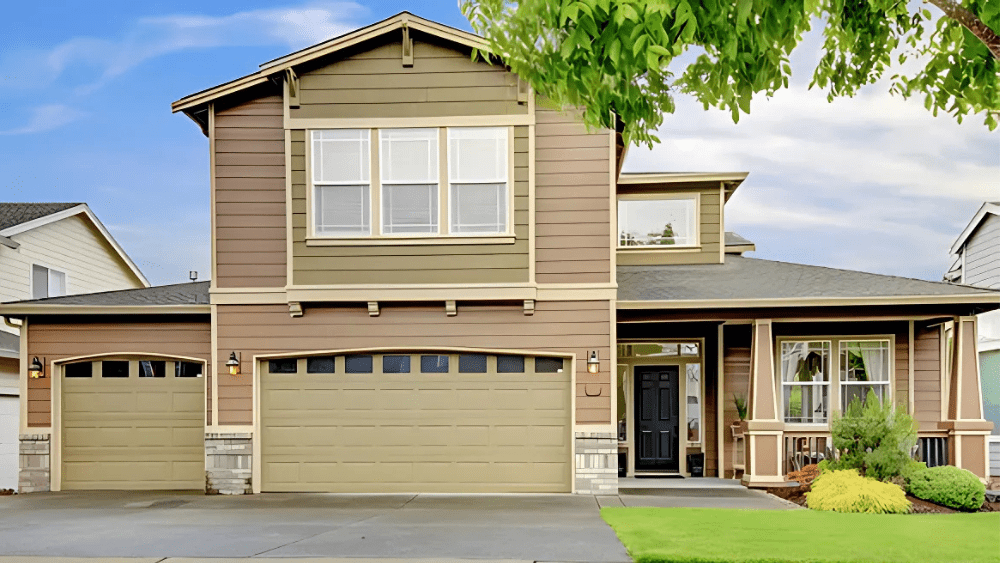Property industry leaders have given the Albanese government a pass-to-good grade on average for its efforts to fix Australia's housing woes.
The federal government has been under pressure to solve the country’s housing challenges – everything from making home ownership and renting more affordable to helping shelter vulnerable Aussies.
Under its housing agenda, the government has committed $32 billion to helping Australians to build, rent and buy, and to reach its target of seeing 1.2 million new homes built.
Housing affordability and cost of living will continue to be high on the agenda, with the next federal election less than a year away.
To unpack the government’s housing agenda and what it has delivered so far, Realestate.com.au approached experts from across the housing spectrum to give the government a grade on its performance.
Prime Minister Anthony Albanese and his government have committed about $32 billion to fixing Australia's housing challenges. Picture: Getty
The housing experts could choose from an A for excellent; B for good; C for pass; and D for fail.
Here's what the property experts had to say on the Albanese government's housing agenda.
Homebuyers
Real Estate Buyers Agents Association of Australia (REBAA) president Melinda Jennison gave the federal government a C, or pass, mark for its efforts to help homebuyers across the country.
“The federal government has made some efforts to address housing affordability and supply by setting an ambitious target to deliver 1.2 million new homes by 2029 through the National Housing Accord,” Ms Jennison said.
“However, the industry is grappling with lagging construction times, unaffordable mortgages and rents, alongside rising population demands, all of which are pressing an already undersupplied market.
Real Estate Buyer’s Agents Association of Australia (REBAA) president Melinda Jennison said more needed to be done to help homebuyers. Picture: Supplied
“Without effective implementation of new housing policies, these targets will not be met.
“We need to see promises turn into action, particularly in state planning reforms and federal funding for infrastructure and social housing, to make meaningful progress for homebuyers.”
The federal government has expanded the home guarantee scheme to help more Aussies get onto the property ladder, but its flagship Help to Buy shared equity scheme remains stuck due to opposition from the Coalition and the Greens.
Renters
For renters, the Albanese government received a C- from Tenants’ Union chief executive Leo Patterson Ross.
Mr Patterson Ross said the federal government came in with rhetoric that resonated with many. “While delivering more than previous governments, the actual outcomes leave a lot to be desired,” he said.
“The Housing Australia Future Fund (HAFF) is indicative of the issue for government – by design it will be many years before we see a significant impact. The government has broad support in the community and on the cross bench for ambitious plans to resolve the housing crisis, but the government has not utilised this political opportunity.
Tenants' Union chief executive Leo Patterson Ross said it would take years for some of the federal government's policies to have a significant impact. Picture: Richard Dobson
“There are some concrete achievements, in particular, the $2 billion Social Housing Accelerator Fund; the return of the National Housing Supply Council; and the Better Deal for Renters. None are at the level they need to be, but indicate willingness to stretch beyond where previous governments had gone.
“The Better Deal for Renters in particular showed that the Commonwealth has a role leading states and territories to lift their approach to renting. It's still being rolled out and some states quickly walked away without consequence so again the intention is good but delivery is less clear.”
The federal government has also increased Commonwealth Rent Assistance by more than 40%, marking the largest increase in over 30 years.
New home building
The federal government sees new home building and increasing housing supply as a critical part to solving Australia’s housing shortage.
Master Builders Australia chief executive Denita Wawn gave the Albanese government a C for home building, while a spokesperson for the Urban Development Institute of Australia gave them a B, or good, mark.
Ms Wawn said the Albanese Government had an ambitious housing agenda and had unveiled an array of policies aimed at boosting housing from social and affordable, to private rental and state incentives for planning reform.
Master Builders Australia chief executive officer Denita Wawn said the federal government had set an ambitious housing agenda. Supplied
“However, several of these policies remained held up in the Senate and others have been undermined by other policy changes such as industrial relations laws, barriers to getting skilled migrants, declining productivity and a lack of incentives to boost domestic apprenticeships,” Ms Wawn said.
“If we're going to build the 1.2 million homes, we need by 2029 there is still a long way to go.”
A UDIA spokesperson said: “The government has put in place a fundamental framework which will allow us to build capacity in the future, but we now need far more funding across the entire housing continuum and a focus on upfront barriers of approvals and completions as well as enabling infrastructure which holds back Australians from finding their forever home.”
“We give a B because they have established several groundbreaking initiatives including National Housing Accord, the Housing Australia Future Fund, and the First Home Buyer Guarantee and we need to see an acceleration of implementation and tracking that is critical to the success of the Housing Accord target.”
Social and community housing
On social and community housing, Community Housing Industry Association chief executive Wendy Hayhurst gave the government a B mark.
"The federal government has made commendable progress on social and affordable rental housing, particularly with the launch of the Housing Australia Future Fund (HAFF),” she said.
“The first round of HAFF commitments will deliver 13,700 social and affordable homes, housing over 25,000 Australians in need.
Community Housing Industry Association chief executive Wendy Hayhurst said the Albanese government had made commendable progress on social and affordable rental housing. Picture: Supplied
"While this is a very solid start, it's important to recognise that addressing Australia's housing crisis requires sustained, long-term effort. The HAFF needs to be quadrupled to give it the scale needed to deliver a year on year social and affordable housing program necessary to tackle the immense backlog of need.
“An investment of this scale should also motivate all the states and territories to do their bit. While the National Housing Accord’s ambition to see 1.2 million homes built in the next five years is important we need to see explicit targets for social and affordable housing. Our long-term goal should be that one in ten homes should be social and affordable housing.
"The establishment of Housing Australia and the National Housing Supply and Affordability Council provide the necessary institutions to drive this agenda forward and we commend the Government for establishing them. However, the true test will be maintaining and expanding investment in future years to achieve a measurable reduction in unmet housing need and positively impact affordability in the private rental market.
"Overall, the government has laid a promising foundation, but continued commitment, funding and action – all articulated in the promised 10-year Housing and Homelessness Plan – are essential to fully address Australia's housing challenges.”
Homelessness
The federal government received a B mark for its efforts to combat homelessness from Homelessness Australia chief executive Kate Colvin.
"The government has got the ball rolling on major reforms needed to address homelessness,” Ms Colvin said.
“Investment in more than 50,000 new social and affordable homes over the next five years will provide urgently needed low cost rentals. A significant portion of these will provide homes for women, children and young people escaping violence so they can avoid homelessness.
Homelessness Australia chief executive Kate Colvin said the federal government had made some important achievements in combating homelessness. Picture: Gaye Gerard/NewsWire
“These investments are in stark contrast to the previous administration's cuts to low cost rental programs, which resulted in the loss of more than 23,000 low cost rentals, and more homelessness in the past six years.
“The government has made funding for homelessness services permanent, which was previously temporary, and reduced homelessness risk for many by twice increasing Commonwealth Rent Assistance.
"These are all important achievements that provide a solid foundation for addressing homelessness and housing affordability in Australia. But the housing crisis has been left to grow over decades and is now a housing emergency that is overwhelming under-funded homelessness services.
"With these problems so ingrained there is no steady state – you have to just keep ploughing ahead to maintain momentum. So sustained effort and investment in social housing and homelessness will be crucial to build on this progress."
Property industry
Looking at the property sector as a whole, Property Council chief executive Mike Zorbas said the federal government was the first to create national housing targets.
“In a world which expects multi-decade problems like the housing deficit to be fixed in a week, the Albanese Government deserves an emphatic Distinction during the policy design phase of its agenda," Mr Zorbas said.
“If they can lead a proper build-to-rent regime through this senate, the grade could be higher.
Property Council chief executive Mike Zorbas said the federal government was the first to create national housing targets. Picture: Supplied
“This is the first federal government reforming enough to create national housing targets and supply incentives to complying state governments. Through these housing targets this government has already unleashed an unprecedented and welcome wave of state planning reforms that will directly create new housing supply and improve our ability to better deal with future population growth.
“Despite the obvious housing crisis, these powerful reforms simply would not have happened without the Accord, the targets and the establishment of the national Housing Supply and Affordability Council. It is also thanks to these targets that during the delivery phase of the next five years all Australians will be able to see of their state government and parliamentarians are doing enough to supply new homes. Some will fail. Let’s find out who they are.
Mr Zorbas said the government had also stayed the course on the essential regular review of the National Construction Code while social housing too had received appropriate attention.
“Next year's report card will be about housing delivery by all levels of government,” he said. “For that phase we will need policies that encourage far more BTR housing, purpose-built student accommodation and retirement living communities.”
Federal Housing and Homelessness Minister Clare O'Neil's office was approached for comment, but didn't respond in time for publication.



















 English (US) ·
English (US) ·